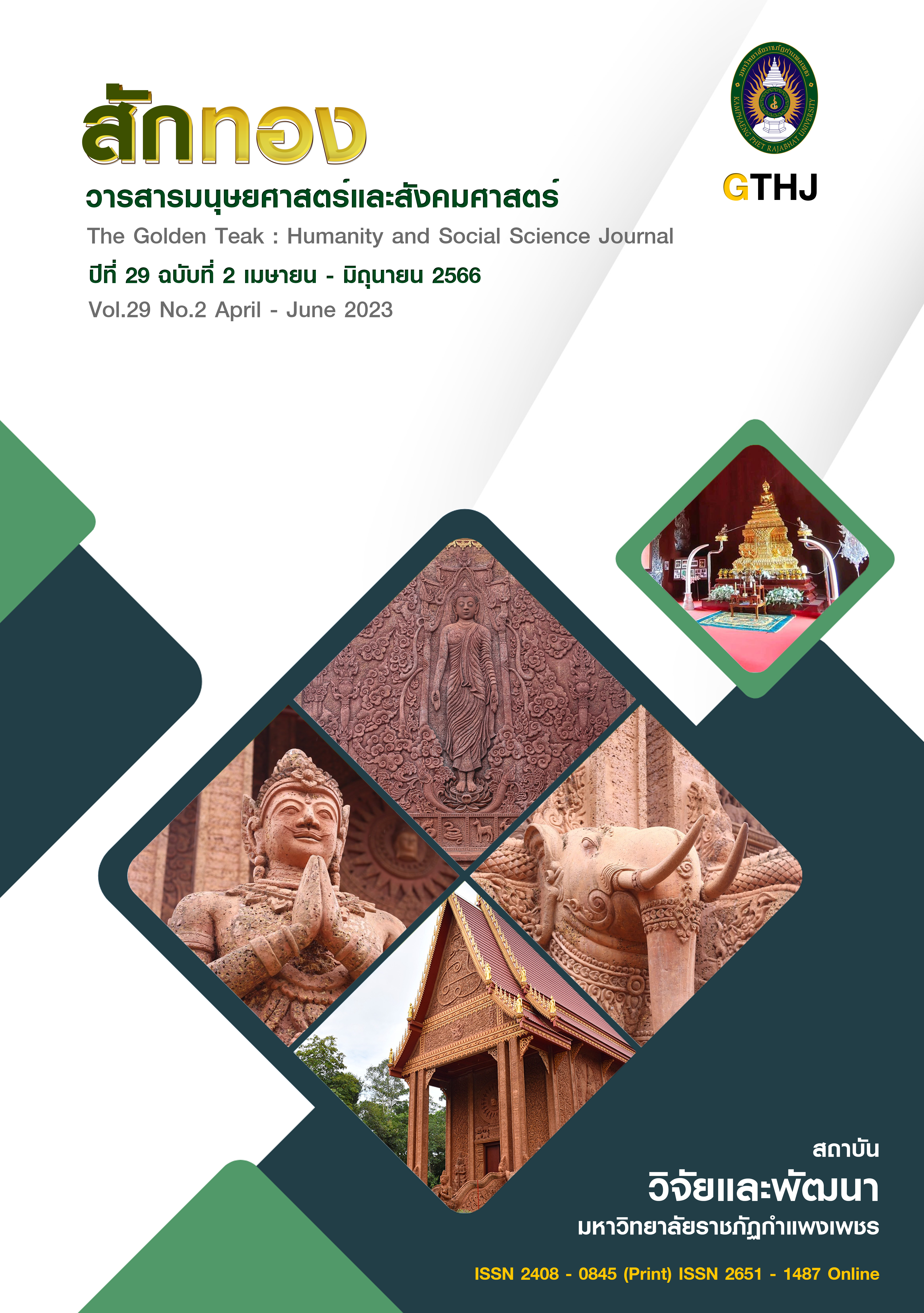The Development of Cross-Cultural Negotiation and Communication of the Manpower in the Eastern Economic Corridor (EEC)
Main Article Content
Abstract
The objectives of this research were: 1) to study the issues in cross-cultural negotiation and communication among the personnel who work for organizations in the Eastern Economic Corridor (EEC). 2) To develop a training curriculum and activities that are tailored to the EEC personnel's needs in cross-cultural negotiation and communication. The survey data were quantitatively analysed using percentage, mean, standard deviation, and chi-square after collecting complete questionnaire responses from 75 respondents who are personnel in the EEC chosen using a purposive sampling technique. The qualitative responses were analysed in the light of conceptual frameworks proposed by Meyer (2014) and Steers & Osland. (2019). It was found that 1) the personnel were unable to express fluently in English due to a lack of English proficiency coupled with limited understanding of cross-cultural knowledge and awareness; they had difficulty communicating with the majority of foreigners, even though the majority of the personnel had the most experience of Thai-English cross-communication. The working lingua franca was mostly English. The nature of the everyday work responsibilities provided an opportunity to communicate with foreigners who served as co-workers, leaders, customers, or superiors to the personnel. The characteristic style of dealing with cross-cultural negotiations was the accommodating style, i.e. unassertiveness and cooperativeness, to maintain rapport with them. Low-context communication was their preferred cross-cultural communication approach. 2) In relation to the training course content, it was found that they intended to learn and explore the issues of negotiation types and its nature, followed by planning negotiating strategies and processes, problems and obstacles in verbal and non-verbal negotiation and communication in cross-cultural contexts respectively.
Article Details

This work is licensed under a Creative Commons Attribution-NonCommercial-NoDerivatives 4.0 International License.
บทความที่ได้รับการตีพิมพ์เป็นลิขสิทธิ์ของวารสาร สักทอง : วารสารมนุษยศาสตร์และสังคมศาสตร์ สถาบันวิจัยและพัฒนา มหาวิทยาลับราชภัฏกำแพงเพชร
ข้อคิดเห็นใดๆ ที่ปรากฎในวารสารเป็นวรรณกรรมของผู้เขียนโดยเฉพาะ ซึ่งมหาวิทยาลัยราชภัฏกำแพงเพชรและบรรณาธิการไม่จำเป็นต้องเห็นด้วย
References
Board of Investment. (2021). Office of the Prime Minister’s Press Release. [Online]. Available : https://www.boi.go.th/upload/content/No.12_2564.pdf [2020, November 26]. [In Thai]
Borba, D. (2016). Design Thinking : A manual for innovation. [Online]. Available : https://medium.com/@demianborba/design-thinking-a-manual-for-innovation-e0576b34eff6 [2020, November 15]
Charunpipatkul, N. (2019). EEC Project: A New Hope for Turning Around the Investment Cycles. FAQ: Focused and Quick. Bank of Thailand, 155, 1-10.
Ghauri, P.N. (2003). A Framework for International Business Negotiations. In Ghauri Pervez N. and Jean-Claude Usunier (eds) International Business Negotiations(pp.3-22). Oxford : Elsevier.
Ghauri, P. & Usunier, J. C. (2003). International business negotiations. (2 nd ed.). Pergamon, Oxford : Elsevier Science.
Holliday, A., Kullman, J. & Hyde, M. (2004). Intercultural Communication. New York : Routledge.
Imai, L. & Gelfand, M.J. (2010). The culturally intelligent negotiator: the impact of cultural intelligence (CQ) on negotiation sequences and outcomes. Organizational Behaviour and Human Decision Processes, 112(2), 83-98.
Liu, L.A., Adair, W.L., Tjosvold, D. & Poliakova, E. (2018). Understanding intercultural dynamics: Insights from competition and cooperation in complex contexts. Cross Cultural & Strategic Management, 25(1), 2-31.
Meyer, E. (2014). The culture map: Breaking through the invisible boundaries of global business. New York : Public Affairs.
Neeley, T. (2017) How to successfully work across countries, languages, and cultures. [Online]. Available : https://hbr.org/2017/08/how-to-successfully-work-across-countries-languages-and-cultures [2021, March 13].
Podhovnik, E. (2010). Cross-cultural Pragmatic Failure in Meetings and Negotiations. [Online]. Available : https://www.researchgate.net/publication/267323483_Cross-cultural_Pragmatic_Failure_in_Meetings_ and_ Negotiations [2021, January 3].
Rogerson-Revell, P. (2007). Using English for international business: A European case study. English for Specific Purposes, 26(1), 103-120.
Steers, R.M., Sánchez-Runde, C. & Nardon, L. (2010). Management across cultures: Challenges and strategies. Cambridge and New York : Cambridge University Press.
Steers, R.M. & Osland, J. (2019). Management across Cultures: Challenges, Strategies, and Skills. (4 th ed.). Cambridge : Cambridge University Press.
Stoshikj, M. (2014). Integrative and distributive negotiations and negotiation behaviour. Journal of Service Science Research, 6(1), 29-69.
Straubhaar, J.D. (1991). Beyond media imperialism: Asymmetrical interdependence and cultural proximity. Critical Studies in Media Communication, 8(1), 39-59.


